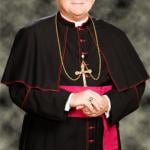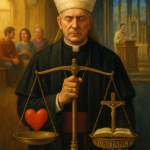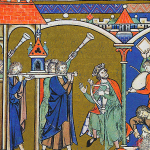Last updated on: March 29, 2015 at 11:32 am
By
CNA Daily News
Rome, Italy, Mar 29, 2015 / 05:32 am (CNA/EWTN News).- Pope Francis on Palm Sunday said that imitating the humility of Jesus is what makes Holy Week “holy,” and encouraged attendees to mimic his attitude of humiliation as the week unfolds. Referring to the day’s second reading from St. Paul’s letter to the Philippians, which recounts how Jesus “humbled himself” by taking on human form, the Pope said that “these words show us God’s way and the way of Christians: it is humility.” Humility, he said, is “a way which constantly amazes and disturbs us: we will never get used to a humble God!” As the Church sets out on the path of Holy Week that leads us to Easter, “we will take this path of Jesus’ own humiliation. Only in this way will this week be holy for us too!” Francis explained. Pope Francis spoke to the thousands of pilgrims present in St. Peter’s Square for his March 29 Palm Sunday Mass, which the Church celebrates in recollection of how the inhabitants of Jerusalem laid palms along the road where Jesus entered on a donkey, hailing him as king the week before he was killed. After processing to the altar with his own palm in hand, the Pope blessed those the pilgrims were holding, and participated in the reading of Jesus’ entire Passion and death, taken from the Gospel of Mark. In his homily Francis focused on how Jesus’ incarnation and death serve as strong examples of God’s humility, which he shows to his people even when they disobey and complain to him. Despite the shame Jesus faced, “this is God’s way, the way of humility. It is the way of Jesus; there is no other. And there can be no humility without humiliation,” Francis said. By taking on the “form of a slave,” Jesus shows us that true humility is expressed in service to others, and consists of stripping and emptying oneself of worldliness so as to make room for God, he said. “This is the greatest humiliation of all,” the Pope noted, and warned against taking that path of the world, which tempts us with “vanity, pride, success,” just like the devil did with Jesus during his 40 days in the desert. However, Jesus “immediately rejected” this temptation, he said, explaining that “with him, we too can overcome this temptation, not only at significant moments, but in daily life as well.” He encouraged attendees to follow Jesus on his path of “humiliation” during Holy Week, and noted how throughout the course of the next week, the Church will participate in Jesus’ suffering in a concrete way. “We will feel the contempt of the leaders of his people and their attempts to trip him up. We will be there at the betrayal of Judas, one of the Twelve, who will sell him for thirty pieces of silver. We will see the Lord arrested and carried off like a criminal; abandoned by his disciples, dragged before the Sanhedrin, condemned to death, beaten and insulted,” he said. In addition, we will also hear how Peter, the “rock” among the disciples, denies Jesus three times and will hear how the crowds, urged by their leaders, call for Barabas to be freed and Jesus crucified. Jesus will be “mocked by the soldiers, robed in purple and crowned with thorns. And then, as he makes his sorrowful way beneath the cross, we will hear the jeering of the people and their leaders, who scoff at his being King and Son of God,” the Pope explained. He closed his homily by recognizing the many who selflessly give themselves in hidden service to others, and by praying for those who are persecuted “because they are Christians.” Referring to them as the “martyrs of our own time,” Francis said these people refuse to deny Jesus and therefore endure “insult and injury with dignity.” He prayed that as the Church sets out on the path of Holy Week, faithful would commit to following Jesus’ way of humility with determination and “immense love” for him, saying that it is this love which “will guide us and give us strength.” After Mass the Pope led pilgrims in the recitation of the traditional Angelus prayer, and noted in comments after how Palm Sunday also marked the 30th World Youth Day, which was established by St. John Paul II in 1984. This year's theme – the second in a series on the beatitudes – is “Blessed are the pure in heart, for they shall see God,” while last year’s was “Blessed are the poor in spirit, for theirs is the kingdom of heaven.” Next year’s theme for the international gathering in Krakow, Poland, will be “Blessed are the merciful, for they will receive mercy.” The Pope also prayed for the 150 victims of the Germanwings Airbus plane crash in the French Alps earlier this week, which included a group of German students, and entrusted them to the intercession of Mary. Francis’ slate of activities for Holy Week includes a Chrism Mass in St. Peter's Basilica on Holy Thursday, as well as a visit to a Roman prison later that evening, where he will wash the feet of inmates and celebrate the Mass of the Lord’s Supper. The next day, Good Friday, the Pope will keep in line with papal tradition and celebrate a service for the Passion of Our Lord in St. Peter’s Basilica before heading to the Colosseum, where he will lead thousands in the traditional prayer of the Stations of the Cross. The Roman tradition of holding the Way of the Cross at the Colosseum on Good Friday goes back to the pontificate of Benedict XIV, who died in 1758. On Holy Saturday Francis will preside over the Easter Vigil in St. Peter’s Basilica starting at 8:30 p.m., during which he will administer the sacrament of baptism to certain individuals. Easter morning, April 5, he will celebrate the Mass of Our Lord’s Resurrection in St. Peter’s Square before giving his 'Urbi et Orbi' blessing – which goes out to the city of Rome and to the world – from the central balcony of St. Peter’s Basilica. Read more















